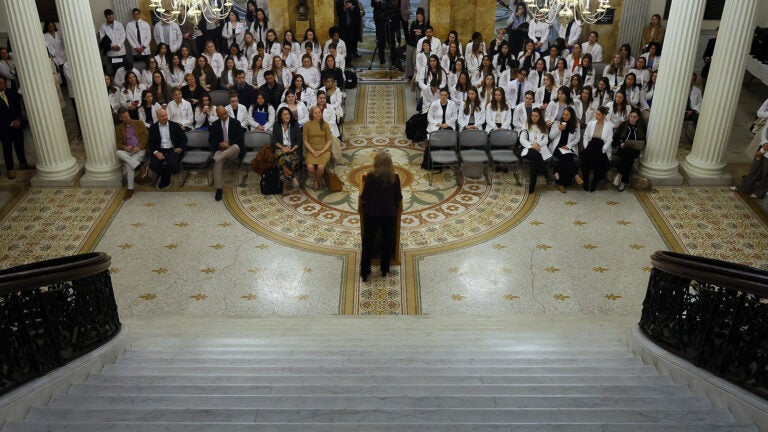Local News
The law, which would enable physician assistants to practice without supervising physicians, could ease the state’s primary care provider shortage.

Hundreds of current and aspiring physician assistants came together inside the Massachusetts State House earlier this month to rally in support of a bill that would remove supervision requirements for physician assistants who have completed 2,000 clinical hours.
-
More than 1,000 Cambridge protesters urge Harvard to condemn Trump administration’s demands
-
A dozen students have visas revoked at Clark University
Under current law, physician assistants can only practice — including prescribing medication and ordering tests — if they have a supervising physician on file in the state. The legislation would remove that requirement, a move proponents believe would help ease the state’s shortage of primary care providers.
When a physician assistant’s supervising physician retires or leaves the field, they have 30 days to find a new supervising physician, The Boston Globe reported. If they don’t, they aren’t able to practice until they find a new doctor to oversee them.
“It’s time to get rid of the archaic administrative requirements, and it’s time to strengthen health care for everyone in Massachusetts,” said Thea Nolan, president of the Massachusetts Association of PAs and a physician assistant at UMass Memorial Medical Center in Worcester, to The Boston Globe.
But the Massachusetts Medical Society’s president, Dr. Hugh Taylor, told the Globe “team-based care” led by physicians is the “optimal model for achieving the best patient outcomes.”
“Supervisory requirements are not merely administrative constraints, they are essential to protecting patient safety and to ensuring patients have access to physician-led care teams,” Taylor said.
A Harris Poll found that Bay Staters cite provider shortages and affordability as the main barriers to accessing health care. Securing a necessary healthcare appointment in Massachusetts takes 5.3 weeks on average for those waiting more than a week, compared with 3.9 weeks nationally. Nearly half of adults in Massachusetts reported delaying or forgoing care in the last two years; almost a third of them attributed that to prolonged appointment wait times. Over a fifth of them reported that they had to forgo care entirely because they couldn’t find an appointment.
As part of the lobbying effort on April 1, PAs advocated for a second bill that would establish a PA interstate compact, enabling physician assistants’ licenses to be recognized in other states. That could bring more physician assistants to the state, which could also help with the shortage.
“We’re here today to talk about that power and the value that we bring to the health care system and the patient lives that are changed by the care that we provide,” Nolan said.
Sign up for the Today newsletter
Get everything you need to know to start your day, delivered right to your inbox every morning.
